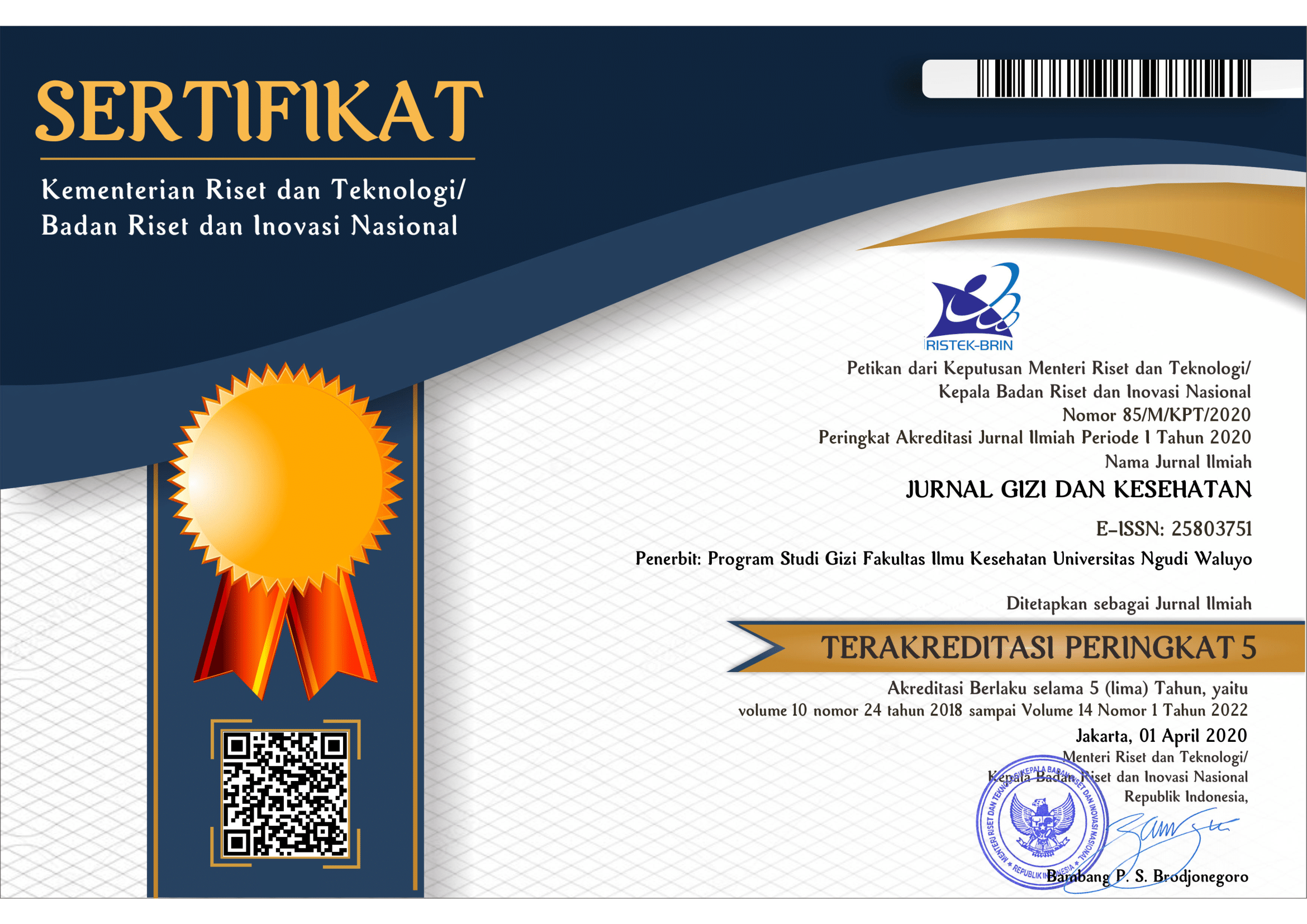Diet Ketogenik dan Dampaknya terhadap Mikrobiota Usus pada Kondisi Diabetes Melitus Tipe 2
The Ketogenic Diet and Its Impact on the Gut Microbiota in Diabetes Mellitus Type 2
DOI:
https://doi.org/10.35473/jgk.v13i1.98Keywords:
Diet Ketogenik, Mikrobiota Usus, Diabetes Melitus Tipe 2Abstract
ABSTRACT
The incidence of type 2 diabetes mellitus (T2DM) increase significantly. Lifestyle changes, including patterns and types of food, have an effect on the occurrence of T2DM. Changes in the composition and type of gut microbiota have a significant impact on the incidence of metabolic diseases, including T2DM. Ketogenic diet, which consist of high fat, moderate protein, and very low carbohydrates, is currently a common diet for weight-loose program in obese people, where obesity is a risk factor for T2DM. However, the use of this diet as management in T2DM subject is still a controversy. It is proven that ketogenic diet can alter the composition of Bacteriodetes to Firmicutes in T2DM subject and may improve the metabolic profile of this subject. The ketogenic diet can be recommended as a diet for T2DM subject with attention to the special conditions of the subject.
Abstrak
Angka kejadian diabetes mellitus tipe 2 (DMT2) meningkat secara signifikan. Perubahan gaya hidup termasuk pola dan jenis makanan berpengaruh terhadap terjadinya penyakit DMT2. Perubahan komposisi dan jenis mikrobiota usus berdampak signifikan terhadap kejadian penyakit metabolik, termasuk DMT2. Diet ketogenik dengan komposisi tinggi lemak, cukup protein, dan karbohidrat sangat rendah, saat ini menjadi tren diet yang banyak dipilih untuk menurunkan berat badan pada orang obesitas, dimana obesitas menjadi salah satu faktor risiko DMT2. Meskipun demikian, penggunaan diet ini sebagai manajemen diet pada individu dengan DMT2 masih menjadi kontroversi. Pemberian diet ketogenik pada individu dengan DMT2 mampu mengubah komposisi Bacteriodetes terhadap Firmicutes dan berdampak terhadap perbaikan profil metabolik. Diet ketogenik dapat direkomendasikan sebagai diet bagi individu dengan DMT2 dengan memperhatikan kondisi khusus.
Downloads
References
Ang, Q. Y. et al. (2020) ‘Ketogenic Diets Alter the Gut Microbiome Resulting in Decreased Intestinal Th17 Cells’, Cell, 181(6), pp. 1263-1275.e16. doi: 10.1016/j.cell.2020.04.027.
Boison, D. (2017) ‘New insights into the mechanisms of the ketogenic diet’, Woters Kluwer Health, 2, pp. 187–192. doi: 10.1097/WCO.0000000000000432.
Bolla, A. M. et al. (2019) ‘Low-carb and ketogenic diets in type 1 and type 2 diabetes’, Nutrients, 11(5), pp. 1–14. doi: 10.3390/nu11050962.
Chang, C., Borer, K. and Lin, P. (2017) ‘Low ‐ Carbohydrate ‐ High ‐ Fat Diet : Can it Help Exercise Performance ?’, Journal of Human Kinetics, 56(March), pp. 81–92. doi: 10.1515/hukin-2017-0025.
Choi, Y. J., Jeon, S. M. and Shin, S. (2020) ‘Impact of a ketogenic diet on metabolic parameters in patients with obesity or overweight and with or without type 2 diabetes: A meta-analysis of randomized controlled trials’, Nutrients, 12(7), pp. 1–19. doi: 10.3390/nu12072005.
Garach, A. M., Perdigones, C. D. and Tinahones, F. J. (2016) ‘Gut microbiota and type 2 diabetes mellitus’, Endocrinologia Y Nutricion, 63(10), pp. 560–568.
Johnstone, A. M. et al. (2008) ‘Effects of a high-protein ketogenic diet on hunger , appetite , and weight loss in obese men feeding ad libitum 1 – 3’, American Journal of Clinical Nutrition, 87(6), pp. 44–55.
Larsen, N. et al. (2010) ‘Gut microbiota in human adults with type 2 diabetes differs from non-diabetic adults’, PLoS ONE, 5(2), pp. 1–10. doi: 10.1371/journal.pone.0009085.
Li, Q. et al. (2020) ‘Implication of the gut microbiome composition of type 2 diabetic patients from northern China’, Scientific Reports, 10(1), pp. 1–8. doi: 10.1038/s41598-020-62224-3.
Liu, J. et al. (2020) ‘Trends in the incidence of diabetes mellitus: results from the Global Burden of Disease Study 2017 and implications for diabetes mellitus prevention’, BMC Public Health, 20(1), pp. 1–12. doi: 10.1186/s12889-020-09502-x.
Marques, A. M. et al. (2020) ‘Effects of the amount and type of carbohydrates used in type 2 diabetes diets in animal models : A systematic review’, PloS one, 15(6), pp. 1–19. doi: 10.1371/journal.pone.0233364.
Masood, W., Annamaraju, P. and Uppaluri, K. R. (2020) Ketogenic Diet, StatPearls. Available at: https://www.ncbi.nlm.nih.gov/books/NBK499830/.
Mcdonald, L. (1998) The Ketogenic Diet : A Complete Guide for the Dieter and Practitioner. Edited by E. Volk. Lyle McDonald.
Nakatani, A. et al. (2018) ‘Dietary mung bean protein reduces high-fat diet-induced weight gain by modulating host bile acid metabolism in a gut microbiota-dependent manner’, Biochemical and Biophysical Research Communications, 501(4), pp. 955–961. doi: 10.1016/j.bbrc.2018.05.090.
Nylen, K., Likhodii, S. and Burnham, W. M. (2009) ‘The Ketogenic Diet : Proposed Mechanisms of Action’, Neurotherapeutics, 6(April), pp. 402–405.
Paoli, A. (2014) ‘Ketogenic Diet for Obesity : Friend or Foe ?’, International Jpurnal of Environmental Research and Public Health, 11, pp. 2092–2107. doi: 10.3390/ijerph110202092.
Qin, J. et al. (2012) ‘A metagenome-wide association study of gut microbiota in type 2 diabetes’, Nature, 490(7418), pp. 55–60. doi: 10.1038/nature11450.
Rolfes, S. R., Pinna, K. and Whitney, E. (2009) Understanding Normal and Clinical Nutrition. 8th edn. Belmont: Wadsworth Cengage Learning.
Sami, W. et al. (2015) ‘Effect Of Diet On Type 2 Diabetes Mellitus: A Review’, International Journal of Scientific & Technology Research, 4(8), pp. 112–118.
Sharma, S. and Tripathi, P. (2019) ‘Gut microbiome and type 2 diabetes: where we are and where to go?’, Journal of Nutritional Biochemistry, 63, pp. 101–108. doi: 10.1016/j.jnutbio.2018.10.003.
Stafstrom, C. E. and Rho, J. M. (2012) ‘The ketogenic diet as a treatment paradigm for diverse neurological disorders’, Frontiers in Pharmacology, 3(April), pp. 1–8. doi: 10.3389/fphar.2012.00059.
Unnikrishnan, R. et al. (2017) ‘Type 2 Diabetes : Demystifying the Global Epidemic’, Diabetes, 66(June), pp. 1432–1442. doi: 10.2337/db16-0766.
Upadhyaya, S. and Banerjee, G. (2015) ‘Type 2 diabetes and gut microbiome : at the intersection of known and unknown Type 2 diabetes and gut microbiome : at the intersection of known and unknown’, Gut Microbes, 6(2), pp. 85–92. doi: 10.1080/19490976.2015.1024918.
Westman, E. C. et al. (2007) ‘Low-carbohydrate nutrition and metabolism’, American Journal of Clinical Nutrition, 86(6), pp. 276–284.
Wheless, J. W. (2008) ‘History of the ketogenic diet’, Epilepsia, 49, pp. 3–5. doi: 10.1111/j.1528-1167.2008.01821.x.
Yang, J. J. et al. (2019) ‘Association of Diabetes With All-Cause and Cause-Specific Mortality in Asia: A Pooled Analysis of More Than 1 Million Participants’, JAMA network open, 2(4), p. e192696. doi: 10.1001/jamanetworkopen.2019.2696.
Zabetian, A. et al. (2014) ‘Global rural diabetes prevalence: A systematic review and meta-analysis covering 1990–2012’, Diabetes Research and Clinical Practice, 104(2), pp. 206–213. Available at: https://www.diabetesresearchclinicalpractice.com/article/S0168-8227(14)00007-2/fulltext#.










